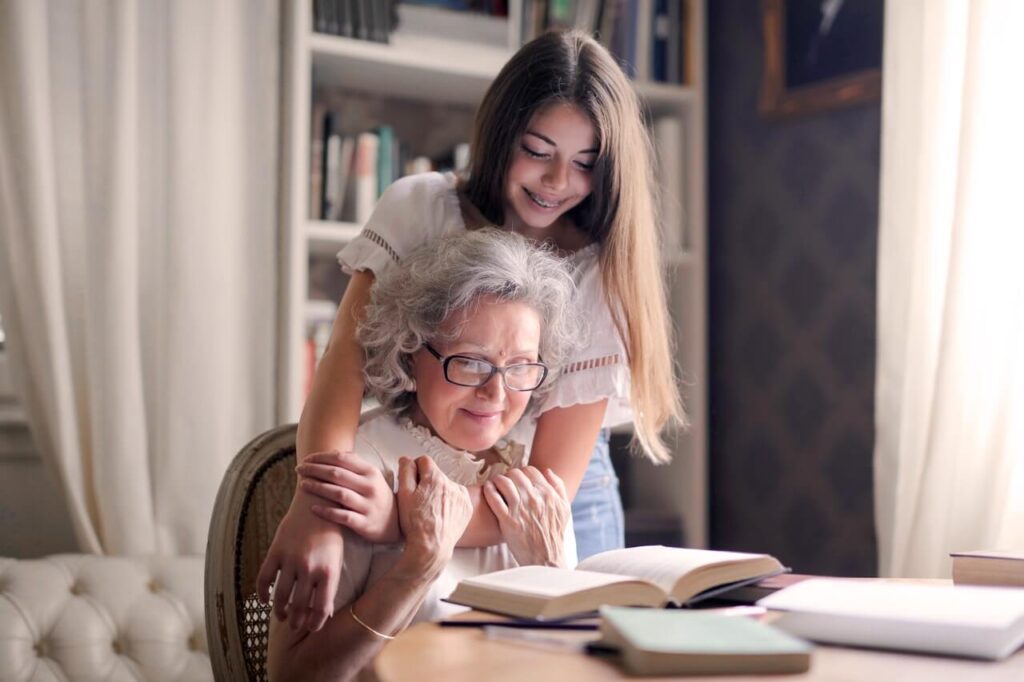Alzheimer’s is a progressive disease primarily experienced by older individuals that affects memory, thoughts, and behaviour through brain atrophy (shrinking) resulting in brain cell death. Alzheimer’s is the most common and well-known type of dementia.
Increasing age is the biggest risk factor for developing Alzheimer’s disease: 3 in 10 people over the age of 85 have dementia.
With such high prevalence of the disease, it is likely that someone older in your life is experiencing or will one day experience Alzheimer’s. In the cases of Sporadic Alzheimer’s and Familial Alzheimer’s, some people in care experience the disease at much younger ages (onset less than 65 years old.)

Caring for someone living with Alzheimer’s can mean daily assistance and care from family members, partners, or close friends. However, if you are caring for someone without following a manageable routine, it can be debilitating for your own mental wellbeing. That’s why it’s imperative to know what is reasonable within your own capacity, and seek professional help in treatment whenever necessary.
Remember, looking after someone also means looking after yourself. With that in mind, read on for our guide on how to look after someone living with Alzheimer’s.
Learn about Alzheimer’s
It can be distressing to learn of an Alzheimer’s diagnosis, but it is important to familiarise yourself with the reality of the disease to best support the person living with Alzheimer’s.
As the disease progresses, Alzheimer’s symptoms worsen. All new or increased symptoms bring new challenges for caregivers. A greater understanding of symptom guides and timelines allow carers to plan for inevitable symptom progressions.
There are three stages of Alzheimer’s disease: mild, moderate, and severe.
Mild Alzheimer’s
In the mild or early stages of Alzheimer’s disease, the effected persons can still go about their lives with much independence. Participation in professional, social, and daily activities is possible.
During the early stage, people may struggle with concentration, foggy memories of recent events, or forgetting certain names or words. In addition to these, difficulties with writing and problem solving may also be present.
Moderate Alzheimer’s
In the moderate stage of Alzheimer’s disease, significant memory loss, confusion and physical symptoms become present.
Common symptoms at the moderate stage include:
- Difficulty with recognition of family members and close friends
- Difficulty with organisation or following instructions
- Struggling with regular daily tasks, such as dressing oneself
- Sleeping troubles or restlessness
- Wandering or losing their way
- Incontinence, either urinary or faecal
- Personality changes, such as lack of emotional regulation, depression, or outbursts
Severe Alzheimer’s
In severe Alzheimer’s – the final stage of Alzheimer’s disease – people require help with almost all basic daily activities, including sitting up, eating, and walking.
In the final stage, people living with Alzheimer’s may have complete loss of the ability to converse, as well as difficulty chewing or swallowing.
It is also possible that they may lose awareness of their environment and become unable to recognise family members.
Create a Routine
Establishing a daily routine will increase the comfort of the person in care, as it reinforces a sense of stability and familiarity for the person living with Alzheimer’s.
Try to avoid any significant changes to the established routine, as this can be distressing or confusing for someone.
When changes are unavoidable, such as switching care settings, it’s best to gradually introduce the change so that the individual with Alzheimer’s can adjust to the new people and places they will encounter.
Do Activities Together
As part of the routine, caregivers can spend time with their loved ones and keep them engaged with a range of activities, such as:
- Exercises, such as walking, light weight training, and stretching
- Dancing
- Playing their favourite music
- Cooking and baking
- Outings to a favourite place, such as a museum, park, or restaurant
- Gardening
- Seeing a movie
- Visiting friends and family
- Playing a straightforward board game, such as Go Fish
When planning outings, it’s best to account for when the person in care is most active and alert.
These times vary from individual to individual: Some take their time to gain energy and become alert over the day, while others awaken at their brightest. Caregivers can discern what works for their loved one by observing energy levels during and after an outing to avoid over-burdening them.
It might be handy to create small business cards to discretely inform others, like service workers, about the person’s living conditions.
The card may say something along the lines of “My loved one has Alzheimer’s disease and may say or do things unexpectedly. Thank you for your understanding.”
Maintain Connections with Others
Communication ability is often significantly impacted in a person living with Alzheimer’s disease. People may forget their thought process halfway through a sentence, or struggle to interpret or remember specific words.
Try using the following strategies to improve communication:
- Maintaining eye contact and smiling
- Using open and relaxed body language
- Asking a single question at a time
- Use the affected person’s name
- Speak with a kind, calm tone; do not use oversimplifications or baby talk
- Remember that if the person experiences an angry outburst, it is the result of the disease, not the person
Communication ensures that the person living with Alzheimer’s maintains a feeling of closeness with their friends and family, whilst also having the chance to participate in more conversations and activities. For the caregiver, communication may provide a reprieve from the pressure of looking after someone they love.
Promote Eating Well and Often
It is important to maintain a healthy diet and proper hydration for people living with Alzheimer’s. Weight loss is a common side effect of Alzheimer’s. Affected persons may not eat properly because they:
- Forget when they last ate
- Forget how to cook
- Have become disinterested in eating because they eat the same foods everyday
- Have become unaware of mealtimes
- Have lost the ability to smell and taste foods
- Have difficulty chewing and swallowing.
You can ensure they enjoy enough nutrient-dense food each day by:
- Serving food at the same time everyday
- Serving food on bright coloured plates to help highlight the food
- Serve large portions at breakfast
- Provide them with a multivitamin
- Provide them with small, easy to eat foods such as fruit, cheese, or finger sandwiches
- Separate eating time from entertainment time: Keep the dining room quiet so they focus on completing their meal
- Make food that is easy to chew and swallow.
Improve Their Confidence
Living with Alzheimer’s can cause anxiety. Anxiety often impacts the affected person’s self-esteem and confidence.
Assisting someone with their hygiene and grooming encourages the person to feel “more like themselves”.
You can:
- Brushing your teeth at the same time they brush theirs
- Help them put on makeup if they usually wear it (no eye makeup)
- Encourage or help a person shave if they usually do so
- Keep their nails trimmed
- Allow extra time for dressing and hygiene in the morning and evening
- Help by choosing and laying out clothes in order of dressing
- Buying loose and comfortable clothing for them
- Buying clothing with Velcro or zippers instead of laces and buttons
Small changes such as these make a huge difference in how the person looks and feels about themselves.
Avoiding Everyday Risks for Accidents or Injury
People living with Alzheimer’s often feel discomfort or fear in everyday situations that they did not previously. Whether they feel unsafe or are in actual danger, it is important to understand that you can assist them in feeling safe.
Persons with Alzheimer’s may be unsure how to interpret ‘wet floor’ signs or navigating from one type of flooring to another – as between carpet and hardwood.
You can help them by:
- Ensuring they have and wear sturdy, comfortable shoes
- Applying brightly coloured tape to the edge of steps
- Padding sharp corners on furniture
- Limiting mirrors in the home
- Putting ‘hot’ and ‘cold’ stickers on or near taps
- Installing safety locks on the stove
- Ensuring they take their medication correctly.
Help the Person Keep their Pets
Older people benefit greatly from having a pet. Animals show love and companionship for someone with Alzheimer’s. Cats, dogs, or other pets are manageable during the early stages and a positive chance for the person to remain active.
When it becomes difficult for the person to care for their pet, you can assist by asking neighbours or friends to help look after walks and feeding times.
Bottom Line
Caring for someone living with Alzheimer’s disease will require more care as their condition progresses, and caregivers may need professional help to give their loved one what they need. You may need assistance performing physically demanding tasks, such as bathing or moving a person.
Professionals are a worthwhile option, especially if the person with Alzheimer’s:
- Needs full-time assistance with daily and personal activities
- Can no longer walk
- Experiences seizures
- Suffers significant weight loss
- Falls or experiences other injuries
- Experiences periods of depression, anxiety, or agitation
- Wanders away or gets lost often.
Asking for help is a sign of strength. Remember that looking after someone means you need to look after yourself too. Experiencing chronic stress, fatigue, or depression are common adverse health effects for caregivers.
Ideally, try to divide up the time that you spend caring for the person with Alzheimer’s so that you have time to rest and be your best self with them. After all, they will enjoy your company much more if you are rejuvenated with them.








